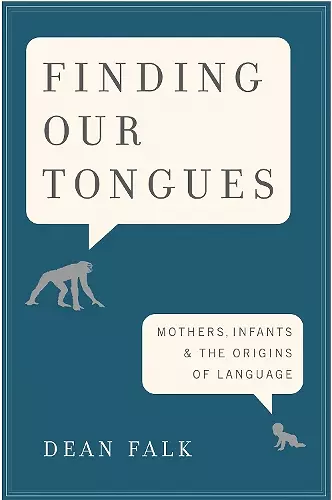Finding Our Tongues
Mothers, Infants, and the Origins of Language
Format:Hardback
Publisher:Basic Books
Published:17th Mar '09
Currently unavailable, and unfortunately no date known when it will be back

Finding Our Tongues : Mothers, Infants, and the Origins of Language
A controversial new theory that the origins of spoken language, music, and art lie in the early communication between mothers and infantsScientists have long theorized that abstract, symbolic thinking evolved to help humans negotiate such classically male activities as hunting, tool making, and warfare, and eventually developed into spoken language. In Finding Our Tongues , Dean Falk overturns this established idea, offering a daring new theory that springs from a simple observation: parents all over the world, in all cultures, talk to infants by using baby talk or Motherese." Falk shows how Motherese developed as a way of reassuring babies when mothers had to put them down in order to do work. The melodic vocalizations of early Motherese not only provided the basis of language but also contributed to the growth of music and art. Combining cutting-edge neuroscience with classic anthropology, Falk offers a potent challenge to conventional wisdom about the emergence of human language.
New Scientist "Falk makes a strong case that communication between mothers and babies is a linguistic crucible." The Nation "The origin of language is a hot topic -- contentious and impossible to prove, but hot. Falk points out that anthropologists have a blind spot where women and babies are concerned: it's always assumed that the hunters and their toolmaking technologies drive evolution, but in the case of language the childcare hypothesis is more grounded in data than others... The drab thought of our ancestors -- hunger on the brain -- hacking away at a deinotherium just doesn't carry the same frisson as Falk's theory, wherein motherese not only stimulates language but theory of mind -- the recognition of intention, of personhood, in someone else." Booklist "[A] provocative hypothesis... A conjecture certain to stir debate." Philadelphia Weekly "Dean Falk's Finding Our Tongues is set to make waves in the anthropological/ linguistic/ scientific community (watch out!) with a new theory of why we speak the way we do... Prediction: The word 'Motherese' will move into popular parlance." The Boston Globe "Original and full of implication... Path-breaking." Franz de Waal, author of Our Inner Ape "That language began with melodious vocal exchanges between mother and offspring is a most attractive idea. It connects language with love, reassurance, and early bodily rhythms. Instead of the traditional focus on words and grammar, Dean Falk's refreshing new theory has the added bonus of injecting music, another human universal, into the language debate." Publishers Weekly "Readers interested in language acquisition may find Falk's hypothesis thought provoking." Francisco Aboitiz PhD, Department of Psychiatry, Pontificia Universidad Catolica de Chile "Finding Our Tongues is an entertaining book, which can be read by both specialists and non-specialists alike. Dean Falk convincingly argues in favor of the universality of motherese in human cultures, and proposes the bold hypothesis that the acquisition of baby talk in early humans represented a key development in language origins. This book will surely stimulate debate about deep and challenging questions on human nature." Psychology Today "Drawing on an impressive array of data, from observations of chimpanzees to neuroimaging, Falk, an anthropologist, suggests that the mother-child relationship trained our ancestors for language, while also contributing to the development of music and art."
ISBN: 9780465002191
Dimensions: unknown
Weight: unknown
256 pages